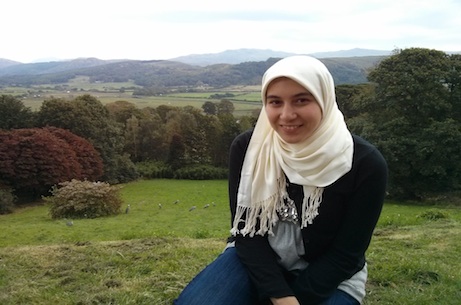
Nouran Abdelfattah's work at Cambridge on translational medicine will build on her undergraduate research on T-cell Acute Lymphobalstic Leukaemia.
Nouran Abdelfattah [2013] is passionate about translating research into drugs that can treat cancer. Her master’s research in translational medicine will build on her undergraduate research on T-cell Acute Lymphobalstic Leukaemia.
Children who relapse with the condition have less than a 30% chance of survival. Higher mortality rates associated with chemotherapeutic drug resistance have led to a greater need for the development of more effective compounds for the treatment of this disease. “Our research aimed to understand why a subset of cells were quiescent during chemotherapy and then remade tumours afterwards,” says Nouran.
“There’s a lot of misdiagnosis in cancer. If we can better identify the biomarkers of disease we can get more drugs approved for clinical treatment. My research focuses on how we can translate research into clinical application.”
Nouran was born in Cairo and is one of the first two Gates Cambridge Scholars from Egypt. She lived in Cairo until she was 13 with her four siblings. Her mother, Nouran and her two younger siblings then moved to Cambridge, Massachusetts in the US to improve the children’s educational opportunities. Nouran’s father, an accountant, was mainly based in Egypt for work and her mother spoke little English so Nouran acted as her translator since she had attended an international school in Egypt. Her older siblings were at university in Egypt.
Nouran says the transition to another country was hard, particularly for her mother whom she describes as her role model, but she states that in hindsight it was a good opportunity to learn about another culture. “It made me more open-minded and it made me more independent,” she says.
Her mother, an architect by training, had to return to Egypt every now and again, leaving Nouran in charge of her siblings with support from her mother’s friends. It taught her to be extremely responsible from an early age.
Swimming
In Egypt she had been a top swimmer – she says the biggest focus of her early childhood was swimming rather than school work – and she won 50 gold medals in national competitions. In the US she continued to compete, including in state competitions, but she dedicated herself more to her academic studies as she saw the kind of opportunities education opened up to her.
When she was 15, her biology teacher at high school encouraged her to apply for a summer internship at the Broad Institute of MIT and Harvard. It gave her the opportunity to do some laboratory research and taught her about the human genome project. “It was really meaningful to me as I could see how science could link up with medicine. From doing that internship I was living and breathing science,” she says.
She applied to Worcester Polytechnic Institute in nearby New England where she majored in biochemistry. The four-year course included research project work in other fields, such as social science, and in science. In her second year, she took part in a summer internship programme at the Harvard Stem Cell Institute and she returned to the Institute for her senior thesis on tumour relapse in zebrafish models of T-cell Leukaemia. Her project involved identifying genes which accelerate tumour progression and attempting to understand the pathways to disease.
It is this work that she is taking forward for her masters at Cambridge in translational medicine. “I am passionate about learning all aspects around clinical drug development and getting more drugs to patients who are relying on our discoveries,” she says.
Nouran hopes eventually to return to the US for medical school and to combine research and being a doctor. Alongside her academic work, she has been volunteering as a patient escort at Massachusetts General Hospital. “I think it helped me more than the patients,” she says. “The patients really open up to you. I learnt a lot about their illnesses and about compassion. I believe a patient’s story by itself is an essential part of diagnosis.”












